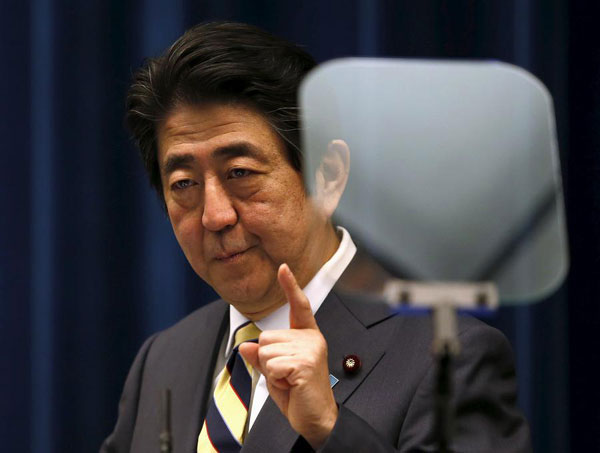New defense minister will not bring Japan closer to neighbors
Updated: 2016-08-08 08:09
By Cai Hong(China Daily)
|
|||||||||
 |
|
Japan's Prime Minister Shinzo Abe addresses reporters on the first official business day of the New Year during a news conference at his official residence in Tokyo, Japan, January 4, 2016. [Photo/Agencies] |
Japanese Prime Minister Shinzo Abe's Cabinet reshuffle last week has commanded much attention.
Among his new 19-strong Cabinet, 13 are members of Rebirth Japan, a conservative bipartisan group of lawmakers. These people arguably make Abe's third Cabinet the most conservative of the postwar era. Abe heads the group that was founded in 2007 to seek "a reawakening of the pride" of the Japanese people in their history and culture, with a special focus on the Imperial House.
The most controversial person sitting in Abe's new Cabinet is Tomomi Inada, who is now Japan's defense minister. Her appointment has raised eyebrows in and outside Japan for her revisionist views of her country's role in the World War II.
Japanese daily Mainichi Shimbun dubbed Inada as a "hawk", and Japan's English-language newspaper Japan Times named her "nationalist".
Inada is a frequent visitor to the Yasukuni Shrine that worships war criminals including 14 A-class ones, and it is where she met Abe, who was the Liberal Democratic Party's deputy secretary-general at the time. (Since then Abe has been her mentor, finding her conservative political credo matches his own. He named Inada minister for administrative reform in his Cabinet in December 2012 when he became prime minister for the second time. And she was chief of the LDP's policy research council before taking on the defense post.)
Inada is a member of the Association of Diet Members for Worshiping at Yasukuni Shrine Together, which organizes lawmakers' mass visits to the Yasukuni and advocates making the shrine a normal place where Japanese Cabinet members and the Emperor can pay regular official worships.
Inada has questioned the legal basis of the Tokyo Trials that convicted Japanese military and political leaders of war crimes. Heading the LDP's policy research council, Inada set up a panel to probe the Tokyo tribunal's verdicts, which, in her words, were "based on a poorly constructed" perception of history, and how Japan's Constitution was written.
She has also questioned whether Japan forced women from the Korean Peninsula and other areas into military brothels. In 2007, she supported a full page announcement in the Washington Post that the women had worked as licensed prostitutes.
She has denied Japanese soldiers engaged in "killing games" during the Nanjing Massacre, which were in fact evidenced by Japan's media.
It is an open secret that Inada is emerging as Abe's hand-picked successor in the LDP. Abe is reportedly said to call Inada the LDP's "Joan of Arc".
Abe is uniting the right wing forces under a like-minded program. Inada has called for changing Japan's Constitution after the LDP and its ruling coalition partner Komeito won a landslide victory in an election for parliament's upper house on July 10.
At a meeting of Rebirth Japan last year, Abe appealed to the conservative LDP members for unity because the party was formed with the aim of revising the country's Constitution and freeing Japan from the regimes created by the Allied Powers.
The Nikkei Asian Review concluded last year that Inada might well become Japan's first female prime minister given the exceptional support Abe has extended to her.
And Inada does not hide her ambition, claiming that every politician aspires to be prime minister.
Abe's Cabinet reshuffle was Japan's internal affair. But his pick of Inada as defense minister will make it difficult for Japan's strained relations with its neighbors to move on.
The author is China Daily Tokyo bureau chief. caihong@chinadaily.com.cn
Related Stories
Abe's support rate drops 7% following LDP-linked scandals, gaffes 2016-02-22 09:37
New blood may not necessarily support the LDP 2016-01-18 08:22
Abe eyes continued LDP majority rule in upper house elections 2016-01-04 11:27
Abe re-elected LDP president, vows economic growth 2015-09-08 21:37
Today's Top News
Bank of England cuts rates to record low, restarts QE
Chinese tech to make Himalayan train possible
London unveils new anti-terror unit amid knife attack
Woman killed, five injured in London knife attack
Fury at Republican Party over Trump snub of Ryan
Ukraine's Savchenko on hunger strike
Chinese tourists robbed in France
5 feared dead as Russian helicopter shot down
Hot Topics
Lunar probe , China growth forecasts, Emission rules get tougher, China seen through 'colored lens', International board,
Editor's Picks

|

|

|

|

|

|







